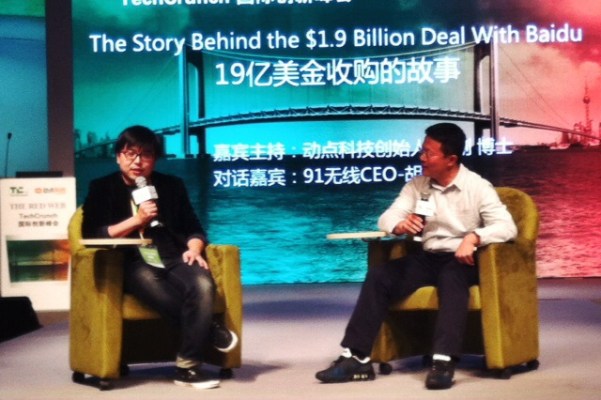After his company, Android app marketplace 91 Wireless, was acquired by search giant Baidu for $1.9 billion in the largest deal in the history of the Chinese Internet, CEO Joe Wu says he is busy with the Baidu integration and also wants to help startups by becoming an angel investor and mentor to other entrepreneurs. During Wu’s fireside chat at the Technode/TechCrunch event in Shanghai yesterday — his first in public since the deal was announced in July — he also talked about life at one of China’s largest Internet companies after heading a startup.
Before its acquisition, 91 Wireless was already one of the top players in China’s lucrative but highly segmented Android app industry. But Wu says he knew that competition would only become more heated thanks to the country’s rapidly growing smartphone penetration rates.
“I struggled with the idea of selling for a long time. When I talked with other companies they were shocked that I was considering the idea,” Wu said. “But I could only see the mobile Internet industry becoming even more competitive. 91 Wireless was a NetDragon subsidiary and we were doing well, but I thought we could collaborate with Baidu because of the synergy between us. $1.9 billion is not the end of our story, I hope we’ll get bigger and bigger.”
Wu liked Baidu’s culture, which he says emphasizes “simplicity and reliability” in their products.
When asked about the record-breaking $1.9 billion deal, which critics considered an extravagant valuation, Wu responded “we can’t say if the price was too high or too low. We just needed someone who could see how 91 Wireless is changing the Internet in China. I thought that maybe we could collaborate with Baidu or Alibaba since the giant companies control the strategic landscape.”
In 2008, when Wu joined 91 Wireless, there were only 10 people in the NetDragon subsidiary. He took over as CEO the next year. Though 91 Wireless grew rapidly, it also had its share of growing pains. At one point, a third of its employees were poached by large tech companies. Wu said that he once became so agitated while thinking about 91 Wireless’s debt and creditors that he nearly crashed his car.
“It made me think that if I had been killed, then those people wouldn’t have caused my death. It would have been my fault. I had to start thinking about how to get away from my depression,” says Wu. “That’s the mindset. No matter what kind of business you start up, everyone is going to get grilled at some point and you have to figure out a solution. You can’t be threatened or crushed by challenges. You need to see them as tests that will fully enhance your capabilities.”
Despite 91 Wireless’s setbacks, Hu said the team had a very “easygoing” attitude. Now that he works for Baidu, Wu says he is busier than ever. “At 91 Wireless I was content as long as I saw growth every day. I wasn’t obsessed with our market share. But at Baidu we’re facing different kinds of competition from other big companies and Baidu has very high targets for its metrics and market share.”
